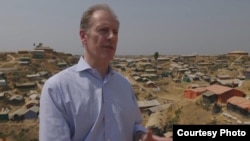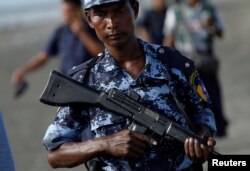Seorang pejabat senior HAM PBB mendesak masyarakat internasional agar terus menekan pemerintah Myanmar agar menghentikan kekejaman terhadap warga Rohingya dan memfasilitasi pemulangan mereka.
“Jelas, tekanan internasional harus dipertahankan terhadap pemerintah Myanmar untuk mencegah pasukan keamanan melakukan tindakan yang sekarang mereka lakukan,” kata Asisten Sekjen PBB Urusan HAM, Andrew Gilmour, kepada VOA, Kamis (8/3), “dan untuk benar-benar diciptakan, bukan sekedar kata-kata, kondisi yang memungkinkan warga Rohingya pulang.”
Gilmour pekan ini kembali dari kunjungan empat hari ke Cox’s Bazaar di Bangladesh, di mana hampir satu juta pengungsi Rohingya tinggal di kamp pengungsi terbesar di dunia.
Sekitar 700 ribu warga Rohingya telah lari dari Myanmar sejak 25 Agustus, setelah serangan yang dilakukan militan Rohingya terhadap pasukan keamanan memicu balasan militer yang menurut penilaian PBB dilakukan secara terorganisasi, sistematis, dan terkoordinir dan merupakan pembersihan etnis.
Penyintas dan saksi mata memberikan laporan mengerikan mengenai bagaimana pasukan keamanan membunuh dan memerkosa warga Rohingya selagi membakar desa-desa mereka di negara bagian Rakhine.
Muslim Rohingya merupakan salah satu kelompok minoritas di Myanmar yang mayoritas populasinya beragama Buddha. Warga Rohingya dianggap sebagai migran ekonomi dan tidak diakui sebagai warga negara Myanmar, meskipun banyak yang dapat menunjukkan bukti bahwa keluarga mereka sudah tinggal di negara itu selama beberapa generasi.
Gilmour mengatakan warga Rohingya yang tidak lari dari Myanmar sekarang kekurangan pangan. “Ini adalah kebijakan kelaparan paksa, dan merupakan kejahatan terhadap kemanusiaan,” kata Gilmour menegaskan. [ds/my]
A senior U.N. human rights official is urging the international community to maintain pressure on Myanmar's government to halt atrocities against Rohingya Muslims and facilitate their return home.
"Clearly, there has to be sustained international pressure on the government of Myanmar to prevent its security forces from carrying out the actions that they are carrying out," Assistant Secretary-General for Human Rights Andrew Gilmour told VOA on Thursday. "And to enable, to genuinely, not just say it, but to genuinely permit the conditions for the refugees to return."
Gilmour returned this week from a four-day visit to Cox's Bazar in Bangladesh, where nearly a million Rohingya Muslim refugees are living in what has become the world's largest refugee camp.
Some 700,000 Rohingya have fled Myanmar since August 25, after attacks by Rohingya militants on state security forces led to military reprisals that the United Nations says were executed in a well-organized, systematic and coordinated manner and are a "textbook example" of ethnic cleansing.
Survivors and witnesses have given harrowing accounts of security forces killing and raping Rohingya while looting and burning their villages in northern Rakhine state. The Rohingya are one of many ethnic minorities in Buddhist-majority Myanmar. They are considered to be economic migrants from Bangladesh and have been denied citizenship in Myanmar, even though most can show that their families have been in the country for generations.
WATCH: UN Official: Keep Pressure on Myanmar to Halt Atrocities Against Rohingya
Gilmour said the Rohingya who have not left Rakhine are now being deprived of food.
"It's a policy of forced starvation," he said. "And it is a crime against humanity."
He said aid agencies have had no access for months to Rakhine. Farmers have had their fields confiscated by the authorities, and their animals have been stolen or killed. In other cases, Rohingya are prevented from leaving their villages — sometimes even their homes — to prevent them from working so they can buy food. Their dire circumstances are forcing many who remained after August to flee now.
The United Nations has had little success getting into Rakhine.
"Since June, we've not had one single person allowed there by the Myanmar government," Gilmour said, referring to the U.N. Office of Human Rights.
A fact-finding mission set up by the U.N. Human Rights Council has not gotten in, and the government dismissed a request last month from the Security Council to visit, saying it was "not the right time."
"There is clearly a lot to conceal going on and the concealing is happening," Gilmour said.
He said for now, the right conditions "clearly do not exist" for the Rohingya to return home in a safe and voluntary manner.
Until they can, he stressed that there must be adequate international support for Bangladesh, which is hosting the refugees.
Work is also being done to document the human rights violations that have been perpetrated against the Rohingya.
The U.N. human rights office is deploying a team to Cox's Bazar to collect testimony from survivors.
Gilmour is also urging that in addition to the fact-finding mission, an independent international investigative mechanism should be set up to look into individual accountability. A similar mechanism is in place for crimes committed in Syria.













